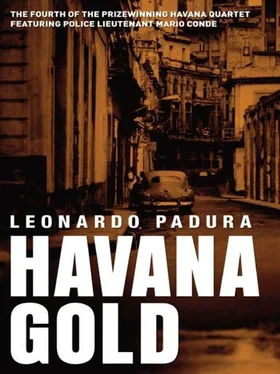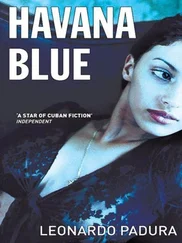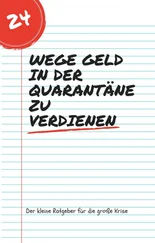“Just as well,” said Jose picking up her knife and fork again. “The chicken’s not so bad, is it?”
The rediscovered scenario of the stadium brought with it a flood of memories. The green grass shining under bluish light and the reddish turf, freshly raked for the start of the game, created a contrast of colours that is the exclusive heritage of baseball grounds. Andrés walked on in front looking for the box they’d fixed for tonight. Behind, Rabbit opened up space for the wheelchair the Count was pushing with all the skill he’d acquired over ten years. “Pardon me, gentlemen,” said Rabbit, who was at the same time trying to watch the Havana pitcher warming up, next to the dugout on the left. The teams were already up on the electronic scoreboard and the murmur descending from the terraces like a waterfall augured a momentous spectacle: Orientales and Havanans were going to engage, once again, as if it were only a game, in a historic contest that perhaps began the day when the colony’s capital was transferred from Santiago to Havana almost four hundred years ago.
The box they’d procured through a patient of Andrés’ who worked in the INDER was in a most sought-after location: right on the edge of the field, between homeplate and third base. Sitting next to Skinny, the Count gazed at the green and brown terrain, the packed terraces, the colours of the uniforms, blue and white on the one hand, red and black on the other, and remembered that once, like Andrés, he’d decided he’d commit his life to those symbolic realms, where the movement of a tiny ball was like the flux of life, unpredictable but necessary for the game to go on. He’d always liked the loneliness of the centre of the park, the wide open spaces, the responsibility of receiving the solid mass of ball against the skin of the glove, the intellectual shock provoked by an instinctive ability that made him run after the white ball the precise moment it flew from the bat and began its capricious journey.
Those were the smells, colours, sensations, skills that came from a possible attachment to a place and time he could revisit simply by seeing and breathing with relish a unique location, deeply buried in his life experience, as close to his heart as the one he associated with fighting cocks. Earth, sweat, saliva, leather, wood, the sweet green smell of trampled grass and, more than once the taste of blood, were sensations his memory and senses had perfectly assumed and assimilated. The Count breathed peacefully: he owned something, with love and squalor.
“To think I could be down there, right?” said Andrés whom the other three had often gone to cheer on in the stadiums of Havana. At one time he’d been the best baseball player at Pre-Uni and the idea of playing on that five-star ground became a dream they all shared, to the day when Andrés realized his potential didn’t in fact extend to achieving such glory.
“I’ve not been back here for ages,” commented Skinny, who was no longer skinny, stroking the arms of his wheelchair.
“Andrés,” Rabbit interjected, “what would you want to be if you had your time again?”
Andrés smiled. When he laughed, precocious wrinkles launched a tumultuous demonstration all over his face.
“A baseball player, I reckon.”
“And what about you, Carlos?”
Skinny looked at Rabbit and then the Count.
“I don’t know. You’d be a historian, but I’m not sure… Possibly a musician, but in a nightclub, where they play mambos and such.”
“And, Conde, would you be a policeman?”
The Count looked at his three friends. They were happy tonight, like the thirty thousand people on the terraces who’d started to whistle at the referees walking out on the pitch.
“I wouldn’t be a baseball player, musician, historian, writer or policeman: I’d be a fucking umpire,” he declared, immediately getting up, turning to the pitch and shouting: “Umpire, bastard, piss-taker…”

The moon’s reflection came through the panes of glass and traced elusive shapes on the top of the bed that transformed grotesquely as the spectator’s perspective shifted. They were forms moulded by solitude. The pillow now seemed an almost round, curled up dog, its neck split down the middle. The sheet, fallen to the ground, an abandoned veil, like a tragic bride’s. He switched the light on and the magic vanished: the sheet lost its tragic character and the pillow resumed its identity as a simple, vulgar, forlorn pillow. In the goldfish bowl, his fighting fish emerged from the lethargic shadows and moved its blue fins as if ready to fly: except that its flight was an interminable circling around frontiers imposed by the roundness of the glass. “Rufino, I’m going to get you some company, but you’ll have to love her like I do,” said the Count and he tapped his nail on the transparent glass and the animal assumed an attacking stance.
He went back into the kitchen and looked at his coffee pot. The coffee had yet to gurgle. The Count leaned the palms of his hands on the small table and contemplated the clear sky under the full moon, at rest and drowsy after so many days of relentless gusts. In the distance he could see the English tiled roof of the barrio’s castle built on the only hill in the place. Rufino the Count, his Granddad, had put some of those tiles in place more than seventy years ago. The fighting cocks had gone, but the castle and its red tiles survived. The smell of coffee warned him it had started to percolate, but he didn’t want to mash sugar. He simply dropped five spoonfuls into the coffee pot and stirred. Waited for the song of percolation to turn into a splutter and switched off the burner. Filled a breakfast cup to the rim and put it on the table. Picked up the shirt he’d abandoned on the other chair and looked for a cigarette. On the table lay the notebook where he’d written down his obsessions over the last few days, as if in the pages of a diary: death, marijuana, forlornness and memories. The effort now seemed a foolish waste of time: he knew he’d never write again and couldn’t stand reading those revelations that had no future. Two nights before, in that same chair, he’d had a happy dream brought on by the music Karina played. It was now an empty chair, like his punctured soul or fragile reservoir of hopes. He thought it was alarming how easily heaven and earth could combine to crush a man like a sandwich about to be chomped painfully. He sipped his coffee slowly, and tried to imagine how he’d get out of bed at dawn. Nobody knows what the nights of a policeman are like, he thought, anticipating he wouldn’t have the strength to re-visit something that had lost all its novelty. As always, he regretted not having a supply of alcohol at home, but he’d never warmed to the frustrating monologue of the solitary drinker. In drink, as in love, you needed good company, he told himself, despite his onanist inclinations. But never drinking.
He stubbed out his cigarette in the bottom of his cup and went back to his bedroom. Put his pistol on the sideboard and his trousers dropped to the floor. Pulled them off with his feet. Opened the windows and switched off the light. He couldn’t read. Could almost not live. He shut his eyelids tight and tried to convince himself that the next best step was to sleep, to sleep, not even dream. He fell asleep more quickly than he thought he would, and felt himself sinking into a bottomless lake, and dreamed he lived by the sea, in a house made of wood and tiles and loved a red-headed woman with small suntanned breasts and skin. In his dream he always saw the sea calm and golden against the light. In the house they roasted a red, shiny fish that smelled of the sea, and made love under the shower that soon disappeared to leave them on the sand, making love, until they fell asleep and dreamed happiness was possible. It was a long, muted, precise dream from which he woke painlessly, when the sunlight re-entered through his window.
Читать дальше












